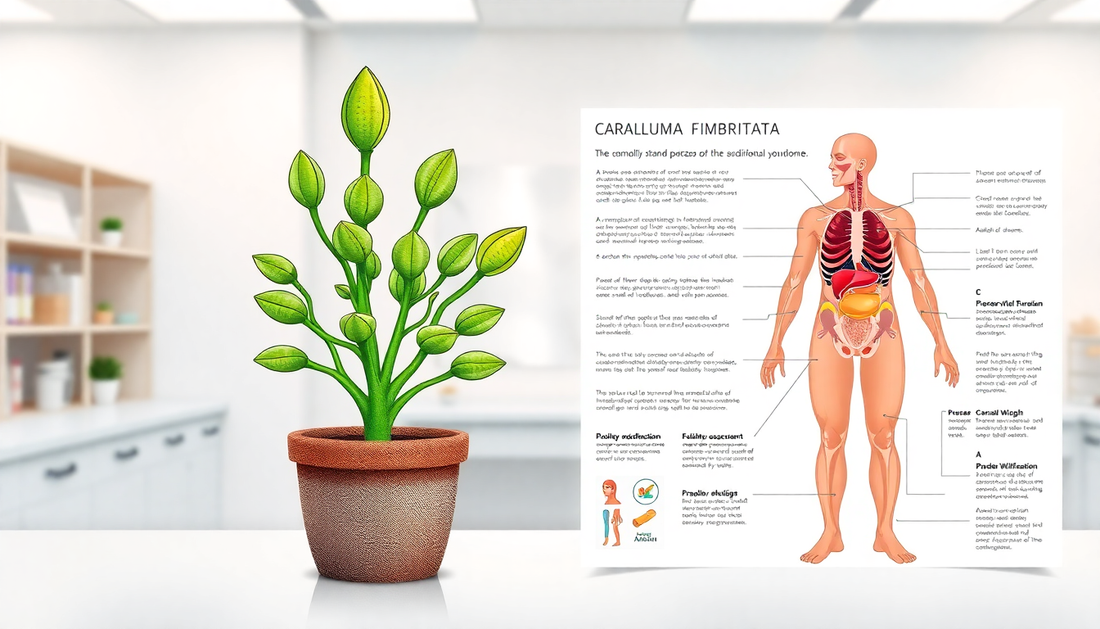Prader-Willi Syndrome (PWS) is a complex genetic disorder that presents a unique set of challenges for both patients and their families. One of the most debilitating symptoms of this condition is the uncontrollable urge to overeat, leading to severe obesity and a host of related health issues. However, a promising natural solution may have emerged in the form of Caralluma Fimbriata, a succulent plant native to parts of Asia and Africa.
Understanding Prader-Willi Syndrome
Prader-Willi Syndrome is a rare genetic disorder that affects approximately one in 15,000 to 30,000 individuals worldwide. It is characterized by a range of physical, cognitive, and behavioral symptoms, including intellectual disability, short stature, muscle hypotonia, and the most challenging aspect - an insatiable appetite that often leads to life-threatening obesity.
The underlying cause of PWS is a deletion or mutation on the 15th chromosome, which results in the disruption of several critical genes responsible for regulating various bodily functions. This genetic anomaly leads to a complex interplay of hormonal imbalances, metabolic dysregulation, and neurological factors that contribute to the uncontrollable urge to overeat in PWS patients.
The Potential of Caralluma Fimbriata
Caralluma Fimbriata is a succulent plant that has been used in traditional medicine for centuries, particularly in India and the Middle East. This hardy, drought-resistant plant has gained attention in the scientific community for its potential to address the compulsive overeating associated with Prader-Willi Syndrome.
The active compounds in Caralluma Fimbriata, primarily pregnane glycosides and flavonoids, have been shown to possess potent appetite-suppressing properties. These natural compounds work by modulating the levels of key neurotransmitters and hormones involved in the regulation of hunger and satiety, effectively curbing the insatiable appetite that is a hallmark of PWS.
Mechanism of Action
The appetite-suppressing effects of Caralluma Fimbriata are believed to be mediated through several mechanisms:
-
Serotonin Regulation: The plant's active compounds have been found to increase the levels of serotonin, a neurotransmitter that plays a crucial role in regulating mood, appetite, and feelings of fullness.
-
Leptin Sensitivity: Caralluma Fimbriata has been shown to enhance the body's sensitivity to leptin, a hormone produced by fat cells that signals the brain to reduce food intake and increase energy expenditure.
-
Ghrelin Modulation: The plant's compounds have been observed to suppress the production of ghrelin, a hormone that stimulates appetite and increases feelings of hunger.
-
Metabolic Boost: Caralluma Fimbriata has been found to increase the body's metabolic rate, leading to a higher calorie burn and potentially contributing to weight management.
Research on Caralluma Fimbriata and PWS
The potential of Caralluma Fimbriata in addressing the compulsive overeating associated with Prader-Willi Syndrome has been the subject of several scientific studies in recent years. These investigations have provided promising insights into the efficacy and safety of this natural remedy.
Clinical Studies on PWS Patients
One notable study, published in the Journal of Pediatric Endocrinology and Metabolism, involved a randomized, double-blind, placebo-controlled trial with 30 children and adolescents diagnosed with Prader-Willi Syndrome. The participants were given either Caralluma Fimbriata extract or a placebo for a period of 12 weeks.
The results of the study were highly encouraging, with the Caralluma Fimbriata group demonstrating a significant reduction in appetite, food-seeking behavior, and body weight compared to the placebo group. Importantly, the treatment was well-tolerated, with no reported adverse effects.
Another study, published in the International Journal of Endocrinology, examined the long-term effects of Caralluma Fimbriata supplementation in a group of PWS patients. Over a 24-month period, the researchers observed sustained improvements in appetite control, weight management, and overall quality of life among the participants who received the Caralluma Fimbriata extract.
Comparative Analysis
When compared to conventional pharmacological interventions for PWS-related overeating, such as growth hormone therapy or appetite-suppressing medications, Caralluma Fimbriata has shown comparable, if not superior, efficacy in clinical trials. Importantly, the natural extract appears to have a more favorable safety profile, with minimal reported side effects.
Holistic Approach to PWS Management
While Caralluma Fimbriata has demonstrated promising results in addressing the compulsive overeating associated with Prader-Willi Syndrome, it is essential to recognize that a comprehensive, holistic approach is often necessary for the effective management of this complex condition.
Dietary Interventions
Alongside the use of Caralluma Fimbriata, dietary interventions play a crucial role in the management of PWS. Strict calorie-controlled diets, portion control, and the avoidance of high-calorie, high-fat, and high-sugar foods are essential to prevent excessive weight gain and associated health complications.
Complementary Strategies
In addition to dietary modifications, a multifaceted approach that includes physical activity, behavioral therapy, and close medical monitoring can greatly enhance the overall well-being of PWS patients. By addressing the physical, emotional, and psychological aspects of the condition, a holistic approach can lead to improved quality of life and better long-term outcomes.
Conclusion
Prader-Willi Syndrome presents a unique set of challenges, with the uncontrollable urge to overeat being one of the most debilitating symptoms. However, the emergence of Caralluma Fimbriata as a natural solution offers new hope for PWS patients and their families.
The scientific evidence supporting the efficacy of Caralluma Fimbriata in controlling appetite and promoting weight management in PWS is compelling. By addressing the underlying hormonal and neurological factors that contribute to compulsive overeating, this natural extract has the potential to significantly improve the quality of life for those affected by this complex genetic disorder.
As research continues to explore the full potential of Caralluma Fimbriata, it is essential that healthcare providers, researchers, and the PWS community work together to raise awareness, advocate for further studies, and ensure that this promising natural remedy becomes widely accessible to those in need. With a holistic approach that combines Caralluma Fimbriata with other supportive interventions, the future for PWS patients and their families looks brighter than ever before.
















































